U.S. Embassy interns Azusa Mogi and Konomi Ishida participated in an LGBT reception at the U.S. Ambassador’s Residence in Tokyo on June 5, 2014. “LGBT” stands for “lesbian, gay, bisexual, and transgender,” and members of the LGBT community worldwide are involved in various activities to promote their rights. The U.S. Department of State and U.S. Embassies around the world facilitate numerous events to support these activities based on the idea that “LGBT rights are human rights.” For LGBT Pride Month in June, the U.S. Embassy invited George Takei to visit Japan as part of a speaker program to increase awareness in Japan about LGBT rights. Takei, who appeared in the popular television series “Star Trek,” is widely considered to be the most successful Japanese-American actor in the United States. Since coming out publicly, he has actively participated in various LGBT-related events and committed himself to the advancement of LGBT rights. In addition to his other speaking engagements, Takei attended the reception at the Ambassador’s Residence.
Below, the two interns discuss their impressions of the event and what they learned about LGBT issues.
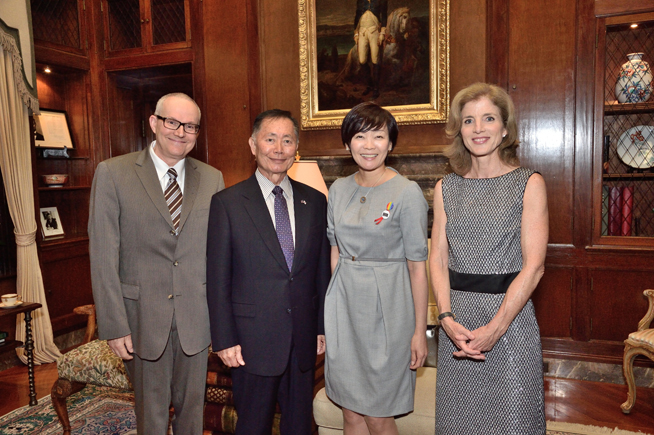
Ishida: It was your first time to attend a party like this at the Ambassador’s Residence, right? What did you think of it?
Mogi: At first I was a little tense because I didn’t know what it would be like to attend an Embassy reception, but everyone was really friendly and it felt just like a party at someone’s home. I was able to enjoy myself without feeling nervous and I was surprised by how fashionable everyone was! There were so many prominent guests from all walks of life, and that made me realize that LGBT issues are drawing a lot of attention in many different fields.
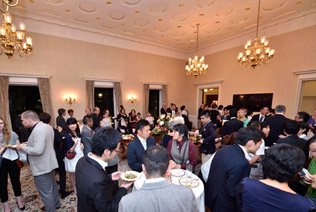
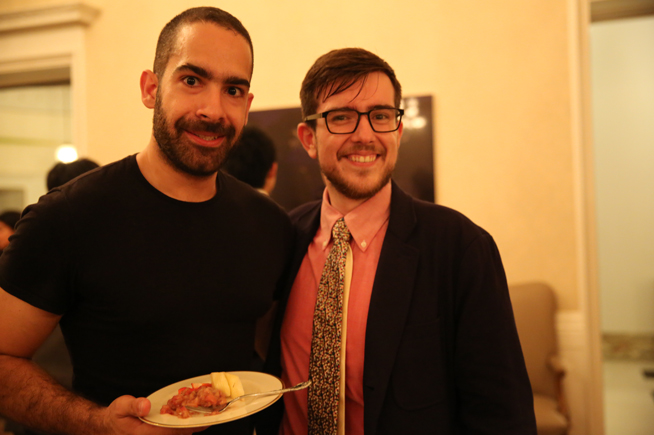
Mogi: A lot of people were wearing clothes in the six colors of the rainbow to represent the rainbow flag for of sexual minorities so it was a very colorful scene! I’m sure you met a lot of LGBT people at the event. What impressed you the most about them?
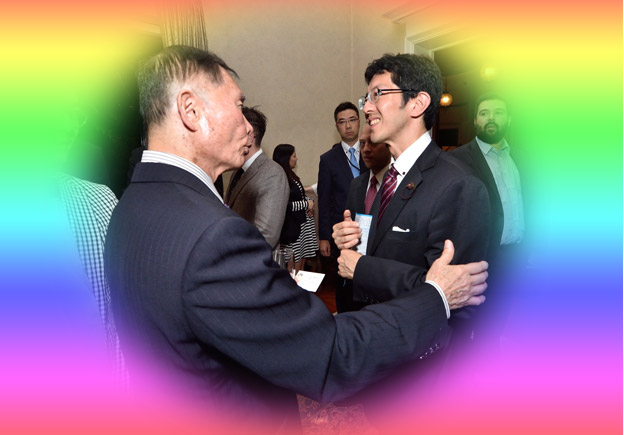
George Takei talks to Wataru Ishizaka, Nakano Ward Assembly member
Ishida: I was so impressed with how cheerful and friendly the LGBT people were. They were all very easy to approach and expressed their opinions so openly. I was really blown away by their power in a good way! I had a chance to speak with Nakano Ward Assembly member Wataru Ishizaka there, and he told me that he organized and supports a consultation center at the Nakano Ward office for homosexual couples that are living together. It was inspiring for me to hear him talk about how he engages in LGBT activities while drawing from his own difficult experiences as a gay man.
Mogi: I talked to a person who changed his gender in the family register to male. But he felt it wasn’t right that despite the fact that he was able to change his gender in the family register from female to male and be officially registered as a man by making use of the special provisions for transgender people, he was treated differently from those who were born male. His claim was eventually acknowledged by the Supreme Court and he was able to register the child that his wife gave birth to using sperm donation as his legitimate child. Filing a lawsuit in Japan is hard enough in the first place, so it is very significant that he filed a claim for his legal rights as an LGBT person and managed to win the case.
Ishida: That’s true. But it’s too bad that his rights weren’t respected until he filed a lawsuit. I’m sure there are many other people in Japan who are dealing with the same kind of problems. By the way, do you know any LGBT people personally?
Mogi: I had one LGBT friend before I went to study in the United States, but he was the only openly gay person I knew at the time. When I was studying abroad, though, I met a lot of people who spoke openly about being LGBT and there was even a married same-sex couple among them. When I went to the U.S., I realized that the situation is different for LGBT people in Japan.
Ishida: A lot of my friends have never even heard of the term LGBT. I guess it’s not very well known in Japan yet. This party was actually the first time for me to speak to an openly gay person. But I think if there are more opportunities like this to communicate with the LGBT community, people will start to realize that we’re all human beings and it’s meaningless to try to draw distinctions between LGBTs and other people.
George Takei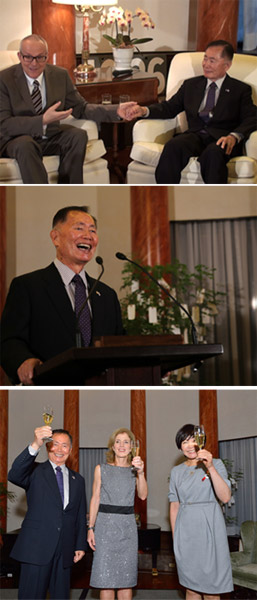
Mogi: I even got to meet George Takei from “Star Trek” at the event. He seemed so passionate about promoting LGBT rights, didn’t he? I think he has the ability to communicate simple messages that even people who don’t know much about LGBT issues can understand.
Ishida: His husband Brad seemed like such a nice person as well! I noticed that he had a really warm expression on his face as he carefully listened to George speak.
Mogi: Takei’s use of the word “hope” numerous times during his interview left a strong impression on me. I think he has high expectations for the future of LGBT people in Japan. With the encouragement of pioneering leaders like him, more people will be inspired to move forward and tackle LGBT issues together.
Ishida: I was very surprised to see that First Lady Akie Abe was among the attendees at the event. Later on I did some research and found out that she’s been involved in activities to help eradicate HIV/AIDS and participated in a meeting of the Joint United Nations Programme on HIV/AIDS. I was really impressed by her efforts to address an issue that I hadn’t really paid much attention to in my daily life in Japan. In her speech at the beginning of the event, she said: “Regardless of differences in sexual orientation, there’s no difference in the importance of one person’s love for another. If I can help LGBT people by raising my voice, nothing could make me happier.” Takei mentioned in his speech that it was the first time in history for the Japanese first lady to actively participate in events like this on the basis of her own views. If more women like her take leadership roles in Japanese society, I think it will help us to overcome not only LGBT issues, but also problems faced by women and other minorities.
LGBT Activities in Japan
Ishida: By the way, I saw people some carrying rainbow flags in Yoyogi Park recently. They were also conducting LGBT activities, weren’t they?
Mogi: Yes, some of the students at my university participated in that event as well. They posted photos of themselves on Facebook wearing rainbow-colored clothes and marching in the parade. It looked like a lot of fun so I definitely want to join in next year. Events like this that anyone can participate in are a great way to get people thinking about LGBT rights, aren’t they?
Ishida: Yes. A lot of the people who attended the party are using fake names instead of their real names when they participate in LGBT activities. I really think the young generation should support them so they can use their real names with pride to participate in their activities, and work together to create a world where anyone can live comfortably.
Mogi: Although the special provisions for handling gender for people with gender identity disorder have made it possible to change a person’s gender in the family register, I think more revisions to Japanese are needed with regard to LGBT rights. Unless people start to think about minority rights as their own problem, such revisions will never be accepted. The LGBT reception really reminded me how important it is to get the word out about the significance of these kinds of activities. I know it’s not easy to change the law, but making more people aware of LGBT rights could be the first step. As student interns, I hope we can help to create a society that accepts sexual diversity!
Ishida: It left a strong impression on me when I heard that George Takei said when he came out that prejudice against gays is similar to racial prejudice. I’m studying African-American issues in college now, so I have a lot of opportunities to think about human rights. When I heard what Takei said, I realized that prejudice against LGBT people is fundamentally the same as the prejudice that African-Americans faced a hundred years ago. I think one of the reasons this type of discrimination is being repeated is that people are simply unaware the issue. I want to spread awareness about LGBT rights and I plan to participate in activities to do so from now on. I hope we can create a world where the term “LGBT” no longer exists because people’s differences are naturally accepted by society. I don’t think I would have felt this strongly about it if I hadn’t attended the LGBT reception, so I’m very grateful I had the opportunity to participate in this event.
“Our journey is not complete until our gay brothers and sisters are treated like anyone else under the law ― for if we are truly created equal, then surely the love we commit to one another must be equal as well,”
Barack Obama -President of the United States-







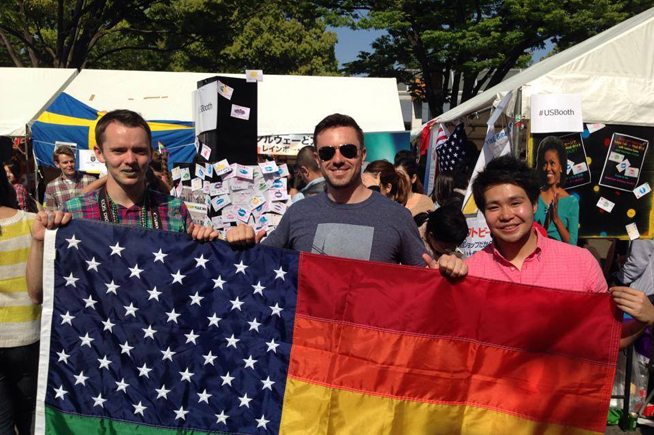
COMMENTS0
LEAVE A COMMENT
TOP